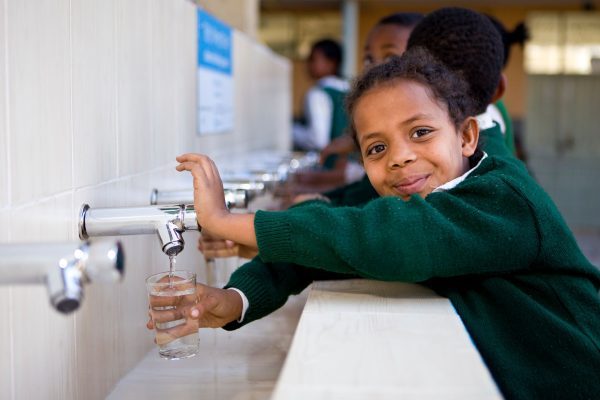By Takalani Netshitenzhe, Chief Officer: Vodacom SA, External Affairs Director
As we continue to address South Africa’s water resources which remain under immense pressure, there is a rising urgency for a long-term and sustainable solution. Between drought, infrastructure woes, load shedding and recent flood damage, along with increasing pollution, climate change and urbanisation, our country’s water supply is not able to meet the demand now and into the future. According to the government’s National Water and Sanitation Master plan, South Africa will experience a deficit of around 10% to 15% of required water by 2030. Without significant interventions in how our water is managed, this deficit will continue to grow.
Faced with a crisis of this nature, it requires input from all stakeholders to better manage our water resources. This holds true for all members of the private sector, regardless of whether they operate in water-intensive industries or not. Everyone in our society stands to be affected by these water challenges – which is precisely why it is incumbent on all of us to take action.
The good news is that there are solutions at our disposal to accelerate change. Human behaviour and technology can empower and assist organisations, communities, and stakeholders in water-saving efforts. Partnerships and solidarity between all sectors of society can further strengthen how we manage South Africa’s water resources and ensure their sustainable use to benefit all.
Promoting responsible water consumption in the private sector
For companies operating in countries like South Africa with water scarcity or inconsistent supply, reducing water consumption and developing measures to manage their water use is imperative. Human behaviour such as rainwater harvesting, re-using water hygienically, and reporting burst and leaking taps and pipes; while using technology, such as the Internet of Things (IoT), can provide innovative solutions to addressing water resource management and improving efficiencies.
Technology is not a panacea to societal challenges but a tool for development. In this regard, installing smart water meters in an office building can provide real-time analytics, which enables proactive action and continued optimisation of water consumption. Maintenance teams receive instant alerts via email or SMS about faults, reducing turnaround times for corrective action to promptly, safeguard water loss.
Other on-premise water-saving measures that organisations can implement include waterless urinals, chemical toilet flushing, waterless hand sanitising stations and aeration taps with reduced water flow, efficient use of borehole water, rainwater harvesting and water wise gardens. In many instances, a few adjustments within an organisation can lead to behavioural changes amongst employees – both at the office and at home. This is where water awareness campaigns have a role to play in driving sustainable behaviours aimed at saving water.
When Vodacom implemented such changes, we managed to reduce our water usage by more than 75%, compared to our consumption in 2017. Many of these modifications were at our head office in Midrand with modifications such as aeration taps with reduced water flow on a larger scale and we replaced all water-cooled chiller plants with energy-efficient air-cooled chillers. These support our data centres, and therefore, reduce water consumption across our operations.
Supporting the public sector with water management services
We are also seeing the power of digital solutions and IoT capabilities in assisting local municipalities monitor and manage water consumption. According to the 2030 Water Resources Group, an average of 35% of water is lost in municipal systems in South Africa, costing municipalities R9.9 billion a year. Through sensors and smart utilities management services, leaks can be detected in water systems and prevent bigger losses later.
Technology can also help in bolstering efficiencies in service delivery. Apps like Thetha Nathi, which we launched in 2017, provide a platform for the public to report faults, burst pipes and quality issues, enabling municipal teams to respond swiftly and dispatch technicians where necessary.
Strengthening water sustainability through strategic partnerships
If we are to make an even bigger, long-lasting impact with various interventions, our actions must be underpinned by powerful partnerships. Sharing capabilities will extend the reach of water-saving initiatives within the public and private sector as well as non-profit organisations and, importantly, help to ensure a common goal of a sustainable future for our country.
The Vodacom Foundation’s work with schools is a case in point. Working with the Department of Basic Education, we have invested more than R6 million in water relief measures for schools in drought-stricken areas in South Africa since 2019. So far, we have reached more than 90 schools and assisted eight Early Childhood Development Centres (ECDs) with donations of equipment like rainwater tanks and boreholes.
In the Eastern Cape, where water scarcity presents a particular challenge, we collaborated with the National Business Initiative (NBI) to donate R500 000 to the Adopt-a-School campaign. These funds were used to maintain and upgrade water infrastructure at eight schools throughout the province. In addition, we supported the training of youth employed by the Community Works Programme (CWP), who are now responsible for taking care of water relief infrastructure. This ensures that the infrastructure at the 100 schools supported by Adopt-a-School remains in good working order.
As part of our commitment to improving the lives of people within the communities we serve, we have donated 20 water tanks to the Tshwane municipality to assist residents affected by water shortages enabling easier access to water supply.
We cannot exist without water, but its security is increasingly under threat. Through technology, and strong partnerships, we can help to conserve this precious resource. At Vodacom, we are investing in water wise initiatives to reduce our environmental impact and create a sustainable future. We urge others to do the same.









